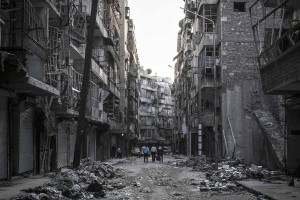
The deepening of the military conflict in that country can be attributed in no small part to the so-called “friends of Syria,” who orchestrated the carefully planned destruction of Syria’s political and economic foundations and are creating chaos on the ground. Using the financial backing of Qatar and Saudi Arabia, they recruited members of the English, American and French special forces to train fighters in the neighbouring Turkey and Jordan. Money and weapons were sent to these thugs by dozens of countries “to support the opposition,” to intimidate the native Syrian population, to create psychological tension in the country and to force the lawful authorities to leave the political arena. The result was the destruction of factories, the health care system and the education system, and the majority of schools, hospitals and pharmaceutical enterprises. What the war hawks of London, Paris and Washington didn’t manage to destroy in the military operations they plotted against the people of Syria was destroyed by mercenary fighters from terrorist organizations who were funded by Wahhabi regimes in the Persian Gulf.
According to estimates by a host of international experts, the military conflict has caused Syria to lose nearly $85 billion up to this point, an amount equal to about 150 percent of the country’s GDP in 2010. The country will need more than 30 years to find its way out of this mess. However, let us not forget that the fighting in Syria is not over yet. Localised skirmishes are still occurring as government troops battle foreign fighters and gangs trying to gain a foothold in the country. Thus, Syria’s losses continue to mount in both financial and human terms.
In these conditions, it is exceedingly important to restore Syria’s statehood and initiate the fast-track “Geneva 2” negotiations to settle the Syrian crisis and stop the senseless bloodshed and further destruction of the country. It is now a secret to no one that the armed “opposition” sponsored by the “Friends of Syria” is in fact a bunch of thugs, many of whom are closely linked to terrorist groups and al-Qaida. Given the circumstances, those countries actively engaged in the fight against international terrorism in recent years, particularly the U.S. and Britain, need to be definitive in whom they support in Syria. If their stated goals to combat international terrorism are not simply propagandist rhetoric and cause for launching military operations against countries not numbered among the “satellites of Washington,” they must demonstrate their commitment to cutting off financial, military and other assistance to the Syrian rebels and force Syria’s opposition to sit down at the Geneva 2 negotiating table.
However, besides political resolution of the conflict, the country’s social and economic tragedy must not be forgotten. This applies to the hundreds of thousands of refugees and families that have lost their homes and their possessions and don’t have the means to continue living and raising their children. It does not appear that the international community will take the Geneva 2 approach to fixing this problem anytime soon, especially given the unwillingness of the Syrian opposition and its sponsors to even hold this conference. Add to that the likelihood that the meeting will be put off to a later date. Besides the establishment of conditions for Geneva 2, increased international action is needed to restore Syria’s residential, industrial and social facilities, especially schools and hospitals.
As one might imagine, the work outlined above would be greatly spurred by the swift organization of specialised international conferences with the true friends of Syria to deal with the socioeconomic recovery of the country. In the process, the initial and subsequent steps would be worked out, the necessary funding for these goals would be channelled through the UN and other international organisations as well as public and private funds, and the appropriate international and bilateral aid programmes would be set up.
Given the fact that Russia and China and their fellow BRICS countries were the most vigorous opponents of the armed opposition’s activities and the military operations against the lawful Syrian authorities, these countries can show initiative in putting together an international conference on the socioeconomic rehabilitation of Syria. The country chosen to host the conference might very well be Russia.
Vladimir Odintsov is a political commentator and special contributor to the New Eastern Outlook online magazine.
